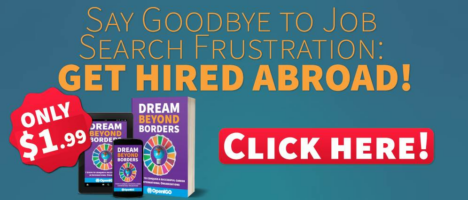The World Bank Young Professionals Program (YPP) selection cycle includes a stage that involves a digital interview (known as the Hirevue interview), an assessment center (group dynamic) and an individual panel interview. At these interviews, the World Bank YPP team aims to gain an in-depth analysis of the candidates’ knowledge, competencies and experience in order to decide the successful candidates of the program – hence, these are decisive phases for you to become the next YP at the Bank!
In this article, we’ll look at the WBG YPP interview methods, especially the panel interview and the assessment center (both are in-person, while the Hirevue interview is online). Knowing about this important phase of the selection process helps you be better prepared, increasing your chances of being selected by the World Bank Group YPP recruiters.
We have prepared a Mock Interview Preparation to get you ready for the World Bank YPP Panel Interview and Assessment Center stages!
Get ready for this decisive stage of the WBG YPP now:
GET PREPARED FOR THE WBG YPP INTERVIEW WITH US HERE!
WORLD BANK YPP – PANEL INTERVIEW
The candidates invited for this phase will receive an e-mail with the details of date, time and city of interview. The questions will be similar to the ones asked in the digital interview, combining behavioral and technical questions. For this one, however, expect higher-level technical questions! Nevertheless, keep in mind that in a synchronic interview with real recruiters, other aspects of the candidate might be evaluated, such as posture, intonation, level of stress, among others. So, in many ways, this stage is even more challenging.
The World Bank YPP uses a semi-structured interview combining different methods, which are the traditional, brain teaser and the behavioral event interview. This interview is conducted by a panel of three (3) World Bank specialists and seeks to analyze technical and behavioral aspects and the candidate’s problem-solving capacity. Candidates should bear in mind that the three main competencies sought by the World Bank are client orientation, professional expertise and team leadership.
|
The World Bank YPP interview seeks to evaluate:
1. The candidate’s knowledge in their area of expertise; 2. The candidate’s knowledge of the World Bank’s other operational areas; 3. The candidate’s competencies; 4. The candidate’s problem-solving capacity; 5. The candidate’s cultural fit with the organization. |
a) TRADITIONAL INTERVIEW
This type of interview is known by many people, since it is widely used by organizations in their selection processes. It is also one of the oldest methods of formulating an interview, following an easily identifiable pattern: the interviewers ask questions, which require short and direct answers, and seek to identify a specific element. The questions posed to candidates are usually linked to elements listed on their resumés, information on the application form and essay. Examples of the questions at this type of interview are as follows:
- Do you prefer working in a group or alone?
- What are your strong and weak points?
- Why should we employ you?
- What are your three main achievements until now?
This approach is demonstrated in the WB YPP interview, in the form of questions about the candidate’s prior work experience, their area of study and specialization, as well as their course completion work (thesis and/or dissertation). The specific aim of these questions is to understand aspects presented by candidates on documents submitted during the process, which may raise questions, and to evaluate certain knowledge from their area of study.
b) BRAIN TEASER INTERVIEW
This type of interview attracted more attention when Microsoft started to use it in their selection processes during the 1990s. The brain teaser interview (also known as a puzzle interview) is an interview method in which the candidate is faced with questions containing enigmas or problems, which should be solved immediately. Some examples of this type of questions are presented below:
- How many coins are thrown into the Fontana de Trevi per year?
- How many people visit Christ the Redeemer in December?
- If you could remove one country from each continent, which would it be and why?
The questions in this type of interview can be divided into two groups: proscriptive and descriptive. Proscriptive questions are those which put forward problems, which have a single correct answer. According to the authors, this type of question tends to identify the candidate’s ability to solve problems. An example of this type of question is: measure four gallons of water precisely using only one three-gallon and one five-gallon bottle. Descriptive questions do not have a single correct answer. The aim of this type of question is to evaluate creativity, the ability to think and solve a problem, considering several variables. An example of a question of this type would be: how many liters of orange juice in cartons are sold in Geneva?
Brain teaser questions provide information such as: 1) How a person performs under stress; 2) The mental process the candidate uses to analyze a problem; 3) How creative or innovative the solution proposed by the candidate is; 4) How the person reacts to unforeseen challenges or difficult problems.
This interview method is also commonly used in the WB YPP selection process. The type of question is descriptive. Questions of this type are posed to the candidates, even though the related topics are not from their area of specialization, precisely because they do not want to evaluate their knowledge, but their problem-solving approach.
As is commonly known, there are many ways to solve problems. However, the World Bank uses neo-institutional economics to solve international development problems. Therefore, understanding the bases and principles of this approach is fundamental, for both the interview and the essay. In order to understand the principles and base concepts of neo-institutional economics, please consult our ebook “The World Bank YPP: The Essential Guide”.
c) BEHAVIORAL EVENT INTERVIEW
The behavioral event interview (BEI) is the type of interview predominant on the World Bank YPP and aims to assess candidates’ competencies. In other words, beyond specific knowledge or the capacity to solve certain problems, these interview questions aim to evaluate whether a candidate has the competencies an organization is looking for.
The BEI is commonly used in the selection process of organizations that already know the competencies they are looking for in their candidates. Therefore, the questions posed during the interview aim to discover whether the interviewee has the competencies pre-selected by the organization. To evaluate competencies, the BEI sets off with the premise that the best predictor of an individual’s future behavior is their past behavior.
When attempting to identify an individual’s competencies from their past behavior, the BEI seeks to: make it difficult for the candidate to invent answers about competencies that they do not really have; avoids subjective evaluations based on future hypotheses and allows the interviewers to explore details in related situations, thereby identifying inconsistencies in the answers provided.
Check out our magazine interviewing a candidate who made it to the final stage of the WBG YPP, with valuable tips about the World Bank YPP Interview Questions and Assessment Center:
PREPARING FOR THE BEHAVIORAL EVENT INTERVIEW

The BEI questions are directed towards the interviewee’s past, focusing on past situations, and allowing specific competencies to be revealed. The questions follow a line of reasoning in which the interviewer leads the candidate to describe a situation or event experienced in the past, the resultant action and the final result achieved (if it was positive or negative)3.
BEI questions usually start with: “talk about a time…”; “give me an example of a time when…”; “describe a situation…” and “how you dealt with a given situation…”. Some examples of these questions are as follows:
- Tell me about a time when you had to work on a project which you considered daunting.
- Describe a situation in which you tried to explain your reasoning to the group but it was not understood. How did you deal with this situation?
- Give me an example where someone came to you to resolve a complicated situation.
- Tell me about a project which you finalized, even though many thought that you were not capable of this.
- Tell me about a time when you had to deal with an unexpected situation.
- Give me an example of when you had to deal with a dissatisfied client.
- Have you ever had a project which failed? Tell me about this experience.
During the interview, it is common for the interviewer to use fact-finding questions, after the candidate has given their answers. These questions aim to clarify certain points about the situations and behavior described by candidates, thereby allowing the interviewer to make a more decisive evaluation of the existence of a specific expected competency.
The responses given in a behavioral event interview have advantages which responses to hypothetical questions or ones based on the future do not, as follows:
- The responses are real.
- In addition to technical knowledge, the response can reveal how decisions were made and problems solved.
- Responses are verifiable. Hypothetical responses cannot be fact-checked, since they never existed.
- Prevents lying. Repetitive details reduce exaggeration. Made-up stories disappear by the third example.
- The interviewer does not have to interpret what a response means. All the responses, based on the questions, should be simple facts that do not require interpretation.
When responding to BEI questions, firstly the candidate should narrate the context in which the situation took place, then report the problem identified, the solution proposed, how it was implemented and the results achieved. This entire sequence should be included, describing the interviewee’s personal contribution to the process.
In other words, what the candidate should always bear in mind is that the main focus of the answers should be themselves. The interviewer needs to precisely identify what the candidate did, even though the situation is related to group work.
|
Pay Attention! Think of your answer as a story! Your response should give examples of the behavior the interviewer is interested in. Remember to give specific examples of situations from your individual experience. |
The candidate should bear in mind that their answers will address past events and may require details to be more consistent. Thus, it is advisable for the situations mentioned to be recent. Here are some criteria which make a story effective and can be used in a BEI response:
- Internal consistency: the story needs to be consistent and cohesive, without any contradictions;
- Consistent facts: the story should be credible and in line with the candidates’ experiences, which the interviewer has prior access to through a resumé;
- Relevance to the question asked: the story responds to the question asked, providing examples that illustrate the competencies the interviewer is looking for;
- Unanimity: the response should lead to a single conclusion and/or interpretation.
In light of the above, specialists argue that the answers given to BEI questions should present the situation, the activity performed and the final result. From this understanding, various techniques structuring responses to BEI questions have been formulated and awarded different titles. The most famous is the STAR technique, which develops the answer through the following line of reasoning:
- S (situation) – The candidate should describe the situation experienced. The description should contain details, so that the interviewer understands the context of the situation, the candidate’s position during the event and which other people were involved.
- T (task) – The task that the candidate was responsible for or was tasked with carrying out in this situation should be explained. This point has to be extremely clear for the interviewer because it will be their guide to evaluating the next points to be included in the answer.
- A (action) – Here the interviewee will talk about the action which s/he took to resolve the problem or the task which arose in this situation. The action should be clearly explained and focus on how the candidate acted: what they did; what they thought and how they conducted the process. Even if a group of people was involved, the candidate should highlight their own participation.
- R (result) – Lastly, the interviewee should include the results achieved at the end, whether negative or positive. These could be: what they learned; the impact the result had on the organization and the activity’s ramifications. If possible, quantify the results.
The other response structuring techniques follow the same fundamental idea as the STAR technique, with a number of differences. Some of these are as follows:
|
BEI Question Response Techniques |
||
|
SAR |
PARLA |
SCARQ |
|
Situation: description of the situation related to the competence included in the question; Action: description of the action taken to solve the problem; Result: what happened; how the situation ended and what results were achieved. |
Problem: the problem that needs to be solved;
Action: description of the action taken to solve the problem; Result: the results achieved; Learning: what the individual learned from the situation; Application: where and how s/he could apply what they learned from this situation to others. |
Situation: description of the situation related to the competence included in the question;
Challenge: the challenge which should be tackled to resolve the situation; Action: the action which was taken to solve the situation; Result-quantified: the results achieved, with metrics. |
Some other tips to construct responses are: make clear your participation in the situation and in developing the solution; whenever possible, quantify the results achieved; when thinking about a situation in which you failed, mention what you learned from it; be careful not to draw out your answers. Focus on the main information. The interviewers can ask for further details in subsequent questions. Develop your public speaking. Since the BEI responses are characterized as stories about specific situations, it is very common for people with above-average oral competencies to stand out.
Want to get a personalized preparation for the World Bank YPP panel interview? Check out our Mock Interview service now:
GET CLOSER TO THE JOB OF YOUR DREAMS WITH OUR WBG YPP MOCK INTERVIEW NOW!
Planning for questions, which may be asked during the interview, is one of the best ways for the candidate to prepare for this stage. To facilitate the preparation of answers to interview questions, the candidate can prepare a list with questions on the competencies to be investigated and prepare answers for each one. To help you with this task, lists of questions that are related to the competencies sought by the World Bank YPP are provided by our ebook “The World Bank YPP: The Essential Guide”.
WORLD BANK YPP – DIGITAL INTERVIEW (HireVue)
For this phase, selected candidates will be invited to take a digital interview through “HireVue” – an online video interviewing tool. This stage has many names: on-demand interview, pre-recorded interview, digital interview, recorded interview, etc. The important thing is that this as decisive for your selection as the panel interview, which is the following stage if you’re successful in this one. It is important to note that the recorded videos will be assessed by real recruiters instead of artificial intelligence as it is customary for HireVue interviews.
The email sent by the WBG YPP team will contain a link that takes you directly to your interview. Practice questions are available for you to check your lighting, camera, and sound and get a better understanding of how the process works. Once ready, candidates will then record their answers to questions that will pop up on the computer screen. After viewing the questions, you will have up to 30 seconds to prepare your answer! Depending on the question, you could be allotted 90 seconds to 3 minutes to respond.
For this interview, candidates can expect a set of 4 to 6 questions – a mix of competency-based and traditional questions. Read this testimonial given by an actual WBG YPP candidate:
“I just took the digital interview. I was asked 4 questions:
- Why are you a good fit for the WBG?
- Mention the biggest challenges in your sector and your approach to them; And how the World Bank should approach them?
- How do your references define you in terms of your ability to show consideration for others?
- What are the biggest challenges that you have faced at work/school?”
OpenIGO offers a digital interview preparation with specialized professionals to help you succeed at your WBG YPP Hirevue Interview.
Click on the button below to learn more about our Recorded Interview Preparation now:
Discover our WBG YPP – Recorded Interview Preparation
Will you apply for the IFC Track of the WBG YPP? Check our IFC Test preparation packages now and get ahead of the competition:
GET READY FOR THE IFC FINANCIAL TESTS NOW!
Do you want to know more details about the WBG YPP interview? Do you want to become the next World Bank Young Professional? We can help! OpenIGO is an extensive network composed of former young professionals, professors and researchers from the best universities in the world, international civil servants and Human Resources specialists.
Have a Mock Interview with us!
Discover our WBG YPP preparation services!











